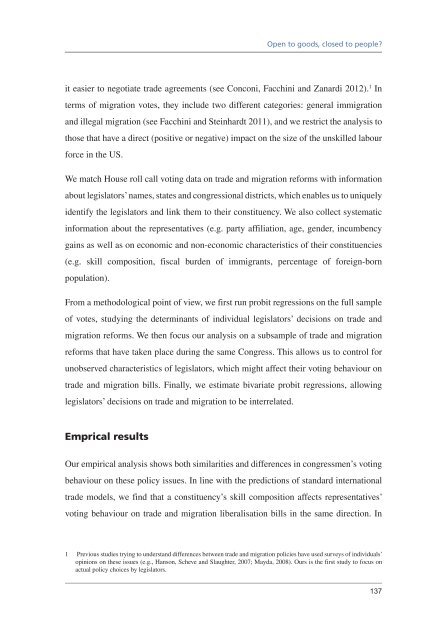Download PDF - Vox
Download PDF - Vox
Download PDF - Vox
- No tags were found...
You also want an ePaper? Increase the reach of your titles
YUMPU automatically turns print PDFs into web optimized ePapers that Google loves.
Open to goods, closed to people?it easier to negotiate trade agreements (see Conconi, Facchini and Zanardi 2012). 1 Interms of migration votes, they include two different categories: general immigrationand illegal migration (see Facchini and Steinhardt 2011), and we restrict the analysis tothose that have a direct (positive or negative) impact on the size of the unskilled labourforce in the US.We match House roll call voting data on trade and migration reforms with informationabout legislators’ names, states and congressional districts, which enables us to uniquelyidentify the legislators and link them to their constituency. We also collect systematicinformation about the representatives (e.g. party affiliation, age, gender, incumbencygains as well as on economic and non-economic characteristics of their constituencies(e.g. skill composition, fiscal burden of immigrants, percentage of foreign-bornpopulation).From a methodological point of view, we first run probit regressions on the full sampleof votes, studying the determinants of individual legislators’ decisions on trade andmigration reforms. We then focus our analysis on a subsample of trade and migrationreforms that have taken place during the same Congress. This allows us to control forunobserved characteristics of legislators, which might affect their voting behaviour ontrade and migration bills. Finally, we estimate bivariate probit regressions, allowinglegislators’ decisions on trade and migration to be interrelated.Emprical resultsOur empirical analysis shows both similarities and differences in congressmen’s votingbehaviour on these policy issues. In line with the predictions of standard internationaltrade models, we find that a constituency’s skill composition affects representatives’voting behaviour on trade and migration liberalisation bills in the same direction. In1 Previous studies trying to understand differences between trade and migration policies have used surveys of individuals’opinions on these issues (e.g., Hanson, Scheve and Slaughter, 2007; Mayda, 2008). Ours is the first study to focus onactual policy choices by legislators.137














